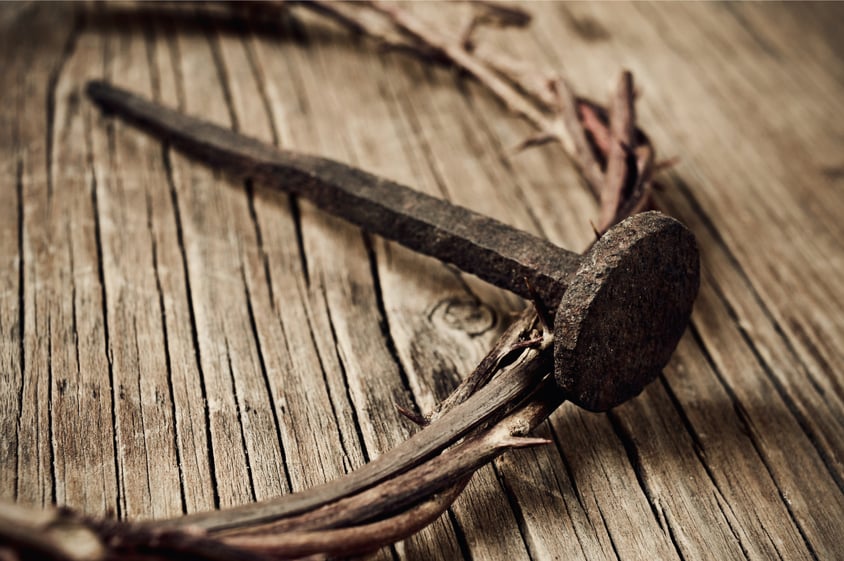God will never abandon me, and that’s no casting of lots.
When I was a child, I recall an instance when our family went to shop at the mall on the south side of the city where we lived. As was custom, we had dinner together and then separated to shop our favorite stores. When 9 p.m. came, the mall was closing and neither my brothers nor my parents were at the pre-arranged gathering point. I was overcome with the fear that I had been abandoned. Much to my relief, my family had not abandoned me, but were merely late. That has stuck with me over the years. Jesus had an experience with abandonment. Except His was real.
Psalm 22 is impressive not only because it paints a clear picture of Christ’s experience on the cross but also because the psalm was written around a thousand years before Jesus took on human flesh and entered the world.
Psalm 22:1, 7–8, 15–18
My God, My God, why have You forsaken Me? Why are You so far from saving Me, from the words of My groaning? . . .
All who see Me mock Me; they make mouths at Me; they wag their heads; “He trusts in the LORD; let Him deliver him; let him rescue him, for he delights in Him!” . . .
My strength is dried up like a potsherd, and My tongue sticks to My jaws; You lay Me in the dust of death. For dogs encompass Me; a company of evildoers encircles Me; they have pierced My hands and feet—I can count all My bones—they stare and gloat over Me; they divide My garments among them,
and for My clothing they cast lots.
Study
- Matthew 27:46 records how Jesus quoted the words of Psalm 22:1 as He hung dying on the cross. We would not be surprised to find anyone suffering the anguish of crucifixion to perceive that he or she had been abandoned by God. Jesus truly had been. Christian art related to the Passion tends to focus primarily on the physical suffering that Jesus endured: the punching, flogging, impressment of the thorny crown, the nails, and the spear. Awful as this was, we are careful not to underestimate the psychological and spiritual agony of His Father’s abandonment. Jesus was abandoned on the cross to fulfill His work of redemption. Recall that God banished Adam and Eve from the Garden of Eden following their fall into sin. In Matthew 22:1–14, in the parable of the wedding feast, Jesus speaks of casting the undressed wedding guest into the outer darkness, where there is weeping and gnashing of teeth. Condemnation bears an element of rejection.
- The comfort of the Gospel is that for the sake of Jesus’ abandonment, we are not cast off. Instead, the Lord sees us from afar, welcomes us, covers us with His robe of righteousness, and ushers us into the place He has prepared for us. We have our wedding garment. Adam and Eve are brought back into Eden.
- Psalm 22:7-8 reflects closely what Matthew 27 records. Jesus had enemies. Some of them were present for the crucifixion for no other reason than to gloat, to delight in His demise, and to be sure He was dead. Jesus’ forbearance is a sweet demonstration of love. God created the tongues that mocked and the heads that wagged. Now that same God, in the Son, suffered the ridicule and disdain. He hung naked, sweaty, and bleeding before the people who should have been His greatest supporters. In one sense, those who mocked Jesus were right to do so. Sin is ugly, and Jesus had become that ugliness. What the jeerers did not realize is that the ugliness was both theirs and ours.
- Verse 15 draws out two macabre features of crucifixion. The psalmist writes, “My strength is dried up like a potsherd.” Victims of crucifixion would grow progressively weaker. Hanging on the cross made it challenging to breathe, forcing the victim to continually push and pull up, aggravating the wounds in the feet and hands. The only alternative was suffocation. The psalmist continues, “My tongue sticks to My jaws.” We are mindful of the fact that Jesus’ injuries resulted in a severe amount of blood loss. With nothing to staunch the flow, our Lord grew thirsty for lack of fluids. Yet there is beauty in the grotesquery. In Jesus’ blood, we are washed whiter than snow. What is more, He gives us this crucified, risen blood in the Sacrament of Holy Communion.
- John records in his Gospel that the soldiers, having crucified Jesus, divided His clothing, a portion for each of them (19:23–24). Yet they cast lots for the tunic, keeping it whole. Casting lots was not unusual. Since the fall of man, societies have used rocks, pieces of wood, seeds, leaves, and the like to divine the future. What makes the behavior of the soldiers so psychopathically cruel is that they cast these lots in front of Jesus while He was still on the cross. They counted a living man’s goods as though He were already dead. Although the soldiers were uncertain of the outcome of the lots they cast, we have absolute assurance of our salvation. Our forgiveness of sins was not left to the roll of a die, but rather to Jesus Christ, our Lord and Savior.
Study the whole Scriptures with the Enduring Faith Bible Curriculum!








.jpg?width=50&height=50&name=IMG_20220621_160541_456%20(1).jpg)





